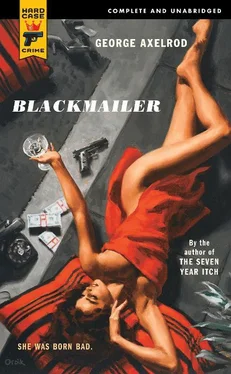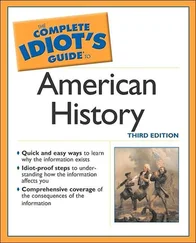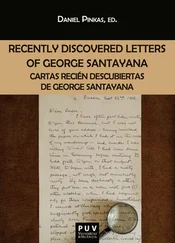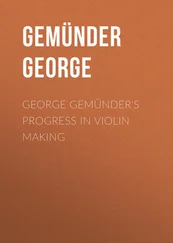George Axelrod - Blackmailer
Здесь есть возможность читать онлайн «George Axelrod - Blackmailer» весь текст электронной книги совершенно бесплатно (целиком полную версию без сокращений). В некоторых случаях можно слушать аудио, скачать через торрент в формате fb2 и присутствует краткое содержание. Жанр: Криминальный детектив, на английском языке. Описание произведения, (предисловие) а так же отзывы посетителей доступны на портале библиотеки ЛибКат.
- Название:Blackmailer
- Автор:
- Жанр:
- Год:неизвестен
- ISBN:нет данных
- Рейтинг книги:4 / 5. Голосов: 1
-
Избранное:Добавить в избранное
- Отзывы:
-
Ваша оценка:
- 80
- 1
- 2
- 3
- 4
- 5
Blackmailer: краткое содержание, описание и аннотация
Предлагаем к чтению аннотацию, описание, краткое содержание или предисловие (зависит от того, что написал сам автор книги «Blackmailer»). Если вы не нашли необходимую информацию о книге — напишите в комментариях, мы постараемся отыскать её.
Blackmailer — читать онлайн бесплатно полную книгу (весь текст) целиком
Ниже представлен текст книги, разбитый по страницам. Система сохранения места последней прочитанной страницы, позволяет с удобством читать онлайн бесплатно книгу «Blackmailer», без необходимости каждый раз заново искать на чём Вы остановились. Поставьте закладку, и сможете в любой момент перейти на страницу, на которой закончили чтение.
Интервал:
Закладка:
I told Miss Dennison to send the boy in. I signed my name on the proper dotted line, and gave the boy a quarter. When Miss Dennison and the boy had gone, I looked at the letter. It was not from an author’s wife. I opened it and read:
MAX SHRIBER, LTD.
ARTIST’S REPRESENTATIVE
CARLYLE HOTEL, NEW YORK
Mr. Richard Sherman
Conrad, Sherman, Inc., Publishers
New York, N.Y.
Dear Mr. Sherman:
This is to inform you that I have been engaged by the literary executors of the late Charles Anstruther to represent and to negotiate the sale of The Winding Road to the Hills, a novel which was completed by Charles Anstruther shortly before his death.
I am hereby offering your firm the opportunity of publishing this book. However, because of the intense interest in this, the last work of America’s leading novelist and Nobel Prize winner, I can only extend to you a twenty-four-hour option. I must have a definite answer from you not later than noon tomorrow. I will be in my office from nine o’clock tomorrow morning. I will be expecting to hear from you.
Sincerely, MAX SHRIBER
I sat at the desk with the letter in front of me, trying to consider the matter calmly.
In the first place, I had never heard of a literary agent named Max Shriber.
In the second place, until less than an hour ago, I had not been aware of the existence of an unpublished novel by Charles Anstruther. Now, suddenly, it had been offered to me not once but twice.
I don’t know how familiar you are with the book publishing business in New York, but believe me when I say that the odds against a firm like Conrad, Sherman, Inc., ever publishing a Charles Anstruther manuscript were probably better than a thousand to one.
Conrad, Sherman was basically a textbook house. We did a novel or two when we could lay our hands on one, but the closest thing we had developed to a bestseller was our “Triple-Cross-O-Grams,” books of puzzles for which there seemed to be an ever bottomless market.
I walked over to the bookshelf and took down a copy of Who’s Who in America and thumbed through the A’s until I came to: Anstruther, Charles, American novelist and short story writer. Born 1895 in St. Louis, Mo.
The entry covered a whole page. It listed his ten books, his five wives, and gave his permanent address as Key West. Under hobbies it said: Big game hunting, skiing, stunt flying, military strategy, deep-sea fishing, fencing, and judo.
I smiled, remembering the story that had been current a few years before. Anstruther, in filling out the form for Who’s Who, had included one other hobby, a short picturesque word in the participle form which he himself had been one of the first to use in print. The editors of Who’s Who had, naturally, deleted it.
Anstruther was probably not a better writer than Steinbeck, Hemingway, or half a dozen others. But he was more colorful. I had met him twice. He had been a large, violent-looking man with a red face and shaggy hair.
I had met him first at a formal dinner in his honor at which he had turned up, quite drunk, wearing boots and a flannel hunting shirt.
The second time had been in the office of the publishing house for which I was then working. We talked for a few minutes, or, rather, he had talked and I had listened in awed silence. He had come to the office to get a second advance on a novel that he had not yet begun. The subject of the conversation was limited to what he proposed to do if the advance were denied. He told me in great detail how he would punch the head of the firm in the belly, throw typewriters out windows and make merry with the young lady at the reception desk. He elaborated on this theme for perhaps fifteen minutes until the head of the firm appeared with a large check. The novel, incidentally, was ultimately completed and was awarded the Pulitzer Prize for that year.
A number of questions had begun to form in my mind. I am a methodical, plodding soul, with a memory like a sieve. I took out a pencil and a scratch pad and began to write down the questions as they came into my mind.
1. Who is Jean Dahl? And if there is a new Anstruther novel, what is she doing with it? 2. Who is Max Shriber? And if there is a new Anstruther novel, what is he doing with it? 3. If either of these people do have the new Anstruther, why in God’s name would they both want to submit it to us?
I looked at the three questions and could not answer any one of them.
In fact, there was only one thing in the whole business that I was sure of.
Before joining Pat to form Conrad, Sherman, Inc., I had worked as an editor at the large, successful publishing house which had, in the past, published Anstruther’s books. I had had the privilege of working on two Anstruther manuscripts. I knew the way he typed, I knew his handwriting, I knew the quality and weight of the yellow paper he generally used. I knew (and this was something few people did know) exactly which words he invariably misspelled. You would have to have worked on his original manuscripts to believe that Charles Anstruther, winner of the Nobel Prize for Literature, had gone to his grave under the impression that immediately was spelled with one m.
What I was getting at is this: I was prepared to swear that the page Jean Dahl had showed me had actually been written by Charles Anstruther.
This did not prove that she had the other three hundred and forty-six pages that would go to make up the rest of a novel. But the possibility did exist.
It was certainly true that Anstruther had had time to write a new book. He had published nothing during the six years before his accident, and during that time he had periodically announced (from Cuba, from Paris, from Korea, from the dozens of places where he was always turning up) that he was at work on a new novel.
However, his drinking, which had always been a problem, was so far out of hand during the last years of his life that no one was greatly surprised when no new manuscript was found among his effects.
The end had been both tragic and a little foolish. Anstruther had accidentally shot himself while cleaning a hunting rifle. He had been, it was later revealed, in an advanced alcoholic stage at the time of the accident.
I picked up the phone and told Miss Dennison to get me Max Shriber’s office at the Carlyle Hotel.
The operator said that Mr. Shriber was out. She said she had no information as to when he would be back. I asked if there were any place where I could reach him. She said that he’d left no message.
“Fine,” I said. “That’s helpful. That’s real helpful.”
I hung up the phone. Then, for the third time, I started to call Pat. And for the third time I decided not to call.
Chapter Two
I was still sitting at my desk at one-thirty when Miss Dennison buzzed me to say that Lorraine Carstairs was outside. “In case you’ve forgotten,” she added spitefully, “you’re taking her to lunch.”
“Oh, my God,” I said. I had forgotten. It is very easy for a man to forget that he’s taking Lorraine Carstairs to lunch. “Tell her I’ll be right out.”
Lorraine Carstairs is the middle-aged alcoholic who is the author, or inventor, or whatever you call it, of the Triple-Cross-O-Gram. Triple-Cross-O-Grams are a combination crossword puzzle and twenty-question game. I have never been able to solve one. I have never desired to be able to solve one.
But we had published six volumes of them and they had never sold less than forty thousand copies. The most recent volume had reached eighty thousand and would probably go on to one hundred.
The first time Lorraine and I had had lunch together I had modestly suggested Schrafft’s. Lorraine had said a short, unprintable word and expressed a preference for Twenty One.
Читать дальшеИнтервал:
Закладка:
Похожие книги на «Blackmailer»
Представляем Вашему вниманию похожие книги на «Blackmailer» списком для выбора. Мы отобрали схожую по названию и смыслу литературу в надежде предоставить читателям больше вариантов отыскать новые, интересные, ещё непрочитанные произведения.
Обсуждение, отзывы о книге «Blackmailer» и просто собственные мнения читателей. Оставьте ваши комментарии, напишите, что Вы думаете о произведении, его смысле или главных героях. Укажите что конкретно понравилось, а что нет, и почему Вы так считаете.












